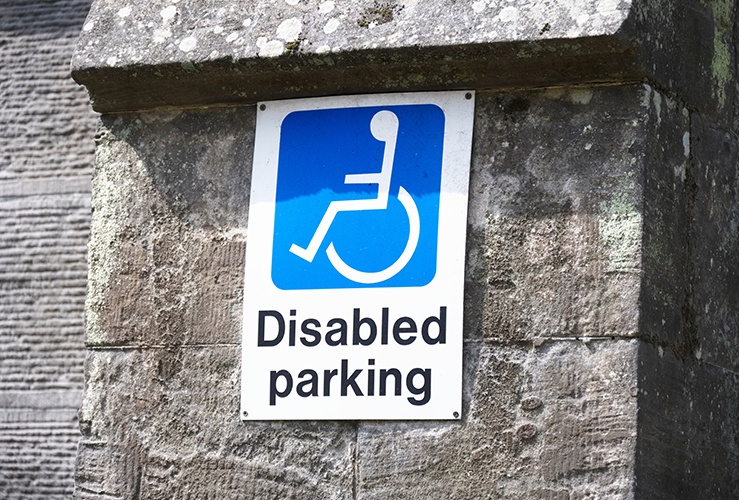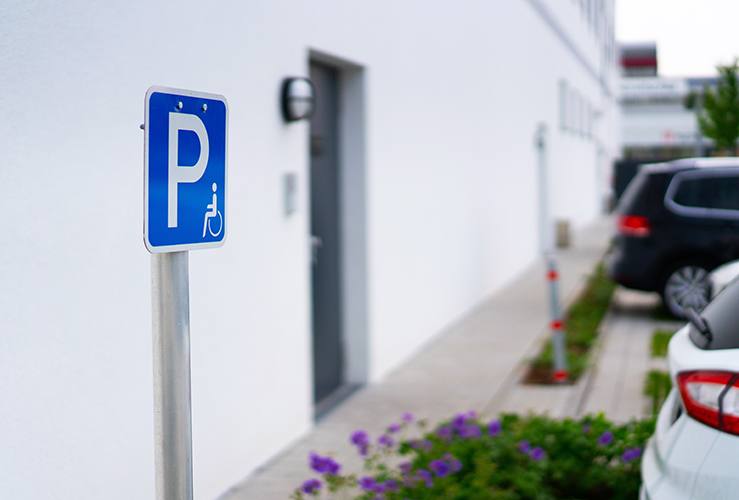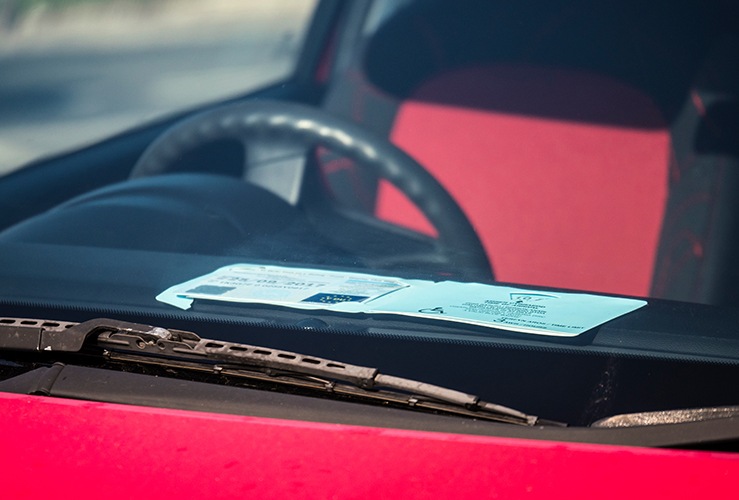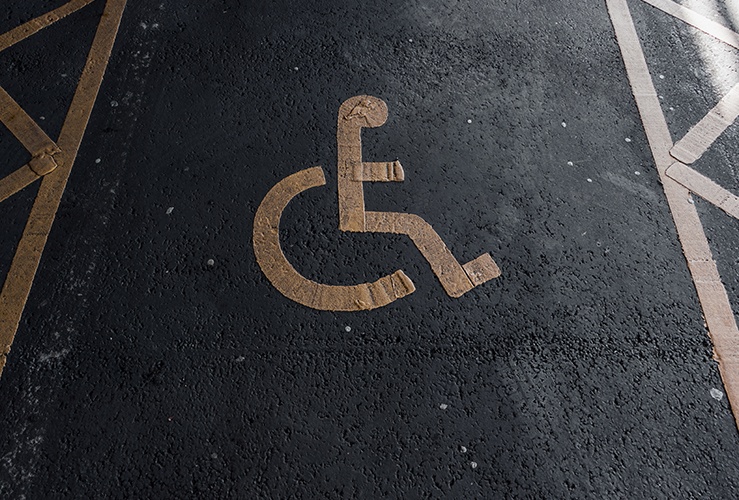The Blue Badge scheme allows disabled people to park for free in certain locations so they can reach the places they need to visit more easily. Here we look at how Blue Badge parking regulations work.
What is a blue badge holder?
Introduced in 1971, the Blue Badge (Disabled Persons' Parking) Scheme allows disabled people to park in a wider range of locations - usually for free - and with fewer time restrictions than non-disabled motorists.
The scheme allows disabled persons to park closer to the locations they need to visit - e.g. supermarkets and doctors surgeries.
Blue Badge parking rights can be exercised as a passenger, too; the badge itself is connected to the person, not their vehicle. For example, if someone is dropping off or picking up a disabled person, the person's badge can be used by that driver. However, failure to explain the rules to the driver could lead to the revocation of the badge.
A disabled person does not need to actually drive to be eligible for a Blue Badge.

Do Blue Badge holders pay for parking?
Blue Badge holders can park in many locations free of charge. However, the rules may differ depending on where you live or where you are at a particular time. For example, there are different Blue Badge schemes for the City of London, City of Westminster, Kensington and Chelsea, Gatwick Airport, Heathrow Airport and Camden.
Where can Blue Badge holders park?
In most cases, Blue Badge holders can park on streets with parking meters/pay-and-display machines for as long as required.
They can also park in disabled bays for as long as needed, unless a sign specifies a time limit.
Can you park on double yellows with a disabled badge?
With a Blue Badge, parking is permitted on double yellow lines for up to three hours, if there is not a 'no loading' sign.
Can I park on a single yellow line with a Blue Badge?
The same goes for single yellow lines - parking is allowed for up to three hours, unless loading restrictions apply.
Where can you not park with a disabled badge?
As a Blue Badge holder you cannot simply park anywhere. You must not park where you might endanger others - for example near a junction or outside a school.

Are private car parks free for Blue Badge holders?
As a Blue Badge holder, you may have to pay to park in private car parks. This might include hospitals, supermarkets, and large commercial parking. In the case of NCP, Blue Badge holders can park for free - but only in disabled parking spaces. Ensure you understand the rules for disabled parking bays before you attempt to park in a private car park.
Do Blue Badge Holders always have visible disabilities?
No, many Blue Badge holders have non-visible disabilities such as dementia and anxiety disorders.
Of the 824,000 Blue Badges issued in 2021 in the UK, some 18,000 were awarded to those with hidden disabilities.
Other members of the public are not always aware that disabilities can be non-visible, which has led to misunderstandings and friction.
What's the minimum age for a Blue Badge holder?
The minimum age for a Blue Badge holder is three years old - it rose from two years old on 10 August 2021. It’s one of the newer rules for blue badge holders.

How should a Blue Badge be displayed?
Blue Badges must be displayed the correct way up and must be clearly visible through the windscreen. It must not have expired.
It’s not uncommon for Blue Badge holders to get a parking ticket. But as long as the badge was displayed, the ticket can be appealed.
What if the "wrong person" gets out of the car?
Blue Badges allow others to ferry disabled persons to where they need to go - for example the shops. In such cases, parking may be permitted on single or double yellow lines - or in another location that able-bodied drivers cannot park.
But if the able-bodied driver - or someone other than the disabled person - gets out to conduct the errand, and the disabled person stays in the vehicle, a parking ticket may be issued. This is because an able-bodied person is physically able to use a regular parking space and walk to the destination.
In short, Blue Badge parking entitlements should only be used if the disabled person in question is actually getting out of the car.
What's the fine for misuse of a Blue Badge?
It's a criminal offence to misuse a Blue Badge - whether perpetrated by the holder or another person. A fine of up to £1,000 could be imposed. Ensuring the Blue Badge scheme is not misused helps to benefit genuine Blue Badge users.
It is fraudulent to use a fake badge, or one that has been stolen or belonged to a deceased person. Under the Fraud Act 2006, anyone suspected of doing this could be charged and prosecuted.

Can a Blue Badge be used abroad?
Blue Badge holders have the same or similar rights when in some other countries. This includes travelling in some EU nations, Liechtenstein, Norway and Switzerland. It's important to understand each countries' disabled parking rules, since they can differ - and a fine may be imposed if you break them.
Can a Blue Badge be used in the USA?
UK Blue Badges may not be accepted in the United States. If you are planning to drive (or be a passenger) in the United States, contact the relevant authorities/property owners to find out what rights you have, or what additional permits you can apply for.
How long is a Blue Badge valid for?
Blue Badges are usually valid for up to three years. A new one must be applied for before the current one expires.
How do I apply for a Blue Badge?
Visit Gov.uk to apply for a Blue Badge. They cost £10 in England, £20 in Scotland and they are free of charge in Wales.
You can apply online. You will need to scan proof of identity (e.g. passport, birth certificate); proof of address and proof of benefits (if any). You'll also need your National Insurance number to hand, and the details of any current Blue Badge - if you're renewing.
How to appeal a parking ticket if you have a Blue Badge?
You might get a parking ticket even if you have a Blue Badge.
Reasons include:
● CCTV system did not recognise your badge
● Your badge was not visible/displayed correctly
● You parked in an NHS car park (free for badge holders) but your badge was not seen/recognised
● You could not reach your car in the specified time due to your disability
You may decide to appeal a parking ticket if you feel it was unfairly given. To do this you need to send proof that you are a Blue Badge holder - such as a letter from the council confirming this is the case.
What if my Blue Badge has been lost, stolen or damaged?
If your Blue Badge has been lost, stolen, or damaged you must apply for a new one. Someone else can also apply for a new badge on behalf of a disabled person.
The replacement badge will only be valid for the same period as the original badge.
Concern over availability of Blue Badge parking spaces
With additional Blue Badges being issued for those with hidden disabilities - such as Parkinsons or chronic fatigue syndrome - there have been concerns there are not enough Blue Badge parking spaces available in the UK. By some estimates, there is only one disabled parking space per 30 Blue Badge holders. The DfT recommends that 6% of parking spaces are reserved for disabled users.
What is the maximum walking distance for a Blue Badge?
While there are many conditions that could make a person eligible for a Blue Badge, the ability to walk a certain distance is a key one. If a person cannot walk 50 metres safely, they would be eligible for a Blue Badge. In terms of a PIP (personal independence payment) assessment, this equates to 8 points on the 'moving around' activity component.
Are Blue Badge holders exempt from the London Congestion Charge?
A person with a valid Blue Badge can apply for a 100% discount on the Congestion Charge. This applies even if the individual does not own or drive a vehicle. Those in possession of a disabled road fund licence (tax disc) will receive this discount automatically, with no need to register.
Other congestion/low emissions zone charges may be discounted for those with a Blue Badge.





